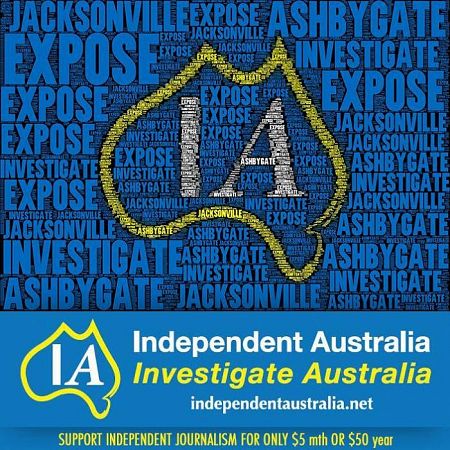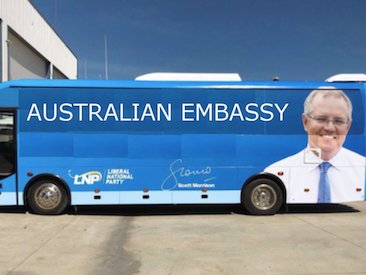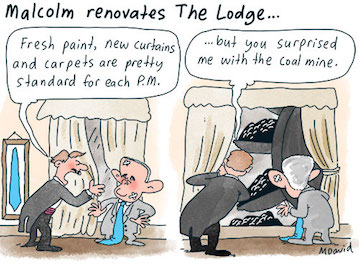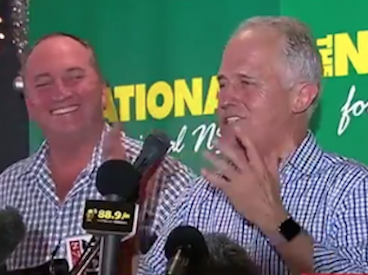Turnbull and Shorten have "respectfully declined" to attend the First Nations Convention at Uluru, indicating their mutual disregard for Indigenous Recognition and a distinct lack of leadership, writes Ingrid Matthews.
THIS WEEK marks 50 years since the most emphatically supported referendum in the history of Australian Federation.
In the 1967 Aborigines Referendum, the Australian electorate voted overwhelmingly to constitutionally empower the Commonwealth to make laws governing "the Aboriginal race".
A "Yes" vote over 90 per cent was unheard of — before or since. This overwhelmingly positive result assumed that the law is not the problem but the solution to injustices.
Unanimity is an anomaly in democracies. The norm is “50 per cent plus one”, which delivers carte blanche to a “tyranny of the majority”, who then invoke the dubious concept of a mandate and proceed to govern in the interests of their own vested class. When Donald Trump governs in the interests of his own — the only novelty is that he ignores conventional democratic charades and his class consists primarily of his family and businesses.
First Peoples, colonialism, constitutionalism (1770-2017)
“The first ten Australian Prime Ministers were vehemently white supremacists. Indigenous people were never included because we were going to die out” ~ Dr Gary Foley.
This "evolutionary paradigm" is an odious hotch-potch of pseudo-sciences, like craniometrics, phrenology, and eugenics. Colonialism simultaneously holds that First Peoples will disappear due to the "natural" superiority of whiteness, and that passing laws which authorise governments to destroy First Peoples societies by force are a legitimate role of parliament and the courts. The fragmented incoherence of this is glued together by racism.
At a global level, the evolutionary paradigm was rejected by the Martinez Cobo study (1986) and subsequently the United Nations Declaration on the Rights of Indigenous Peoples 2007 (UNDRIP). Yet ongoing acceptance of unscientific and destructive mindsets remains difficult to dislodge from the minds of "democratic" polities.
In 2007 in Australia, the incoming Labor Government campaigned on a platform which included signing the UNDRIP and apologising to the surviving Stolen Generations and their descendants. The Apology was a 'Bringing Them Home' (1997) recommendation, which reported on the trauma caused by those eugenicist laws and practices.
On 13 February 2008, Prime Minister Rudd delivered the Apology alongside 'Closing the Gap' – a policy to address First Peoples health and well-being – and a commitment to begin work towards recognising First Peoples in the Australian Constitution. The 50th anniversary of the 1967 referendum was visualised as a timely point to achieve this constitutional recognition.
That deadline falls this Saturday, 27 May 2017 and will not be met. This is not of huge moment. The date was largely symbolic and if there is one thing the Black leadership of the Referendum Council has worked for, it is moving the campaign beyond mere symbolism.
White leadership failures
"Recognise" began life as a government-funded feel-good campaign, with a social media strategy relying on cute Black children and sports stars. As with Federal governance generally, it has been derailed by the chronic instability that has seen five Australian prime ministers in ten years. This dismal display of political incompetence at the highest levels is an emphatic failure of a system that installs people like Tony Abbott and Donald Trump as national leaders.
Meanwhile, a group of Aboriginal and Torres Strait Islander people began re-shaping Recognise. Predictably, conservative cheer squads complained that Black leadership of Black Recognition is "divisive". This incoherent nonsense is part of that racist "glue" and demonstrates the incapacity of Whiteness to identify itself as a barrier to meaningful change rather than the (paternalistic) pathway.
Nevertheless, 12 Referendum Council Dialogues were conducted across the country and will culminate in a national First Nations Convention on 26-28 May at Uluru. The date – the 50th anniversary of the 1967 referendum – does carry symbolism. It remains to be seen whether an agenda beyond symbolism emerges from the conference that white Australia can accept and will endorse.
Prime Minister Malcolm Turnbull and Opposition Leader Bill Shorten have "respectfully declined" an invitation to Uluru. According to the Sydney Morning Herald, they "discussed their attendance" (that is, non-attendance) and determined that their presence "risked being interpreted as an attempt to influence the outcome". The evidence proffered for this "risk" was, of all things, past obstructionism by former prime minister and racist curmudgeon John Howard.
Indigenous Australia News Top story: Thanks, but no thanks: Malcolm Turnbull an… https://t.co/dXEyUIT86z, see more https://t.co/WNSmFmp7fl
— Tracey Withhope (@traceywithhope) May 20, 2017
Howard sailed into office promising "bucket loads of extinguishment" after Native Title was recognised at common law by our High Court (Mabo v Queensland(1992) and by statute in the Australian Parliament (Native Title Act 1993 Cth). He disgraced himself at the Bringing Them Home conference, thumping the lectern, hectoring people he was incapable of seeing as equals. He gracelessly refused to endorse the Council for Reconciliation final report (2000) or cross bridges alongside hundreds of thousands of Australians. In 2004, he campaigned on a promise to dismantle the Aboriginal and Torres Strait Islander Commission (ATSIC), citing the usual racist tropes on internal governance. By 2005, this national representative body elected by First Peoples was gone.
Another way?
It is possible the First Nations Convention leaders invited Turnbull and Shorten as a pro forma gesture, on the understanding it would be declined. Maybe backchannel negotiations sought to head off the screeching commentariat who – despite being entirely absent from any constructive debate – would complain loudly at any perceived slight of excluding the white leadership. The Uluru delegates may well be relieved to not have to allocate valuable time and expertise to walking Turnbull and Shorten through the intricacies of the issues at hand.
It seems equally likely that the invitation was issued with a strong sense of protocol, and came with generosity of spirit or at least acute pragmatism — the sure knowledge that major party support is an essential component to effecting meaningful, functional, positive, change.
More details may emerge, or not. I am not a representative and this is not really my concern. The question that keeps recurring in my mind is this: can you imagine Whitlam or Keating declining an invitation to Uluru from a group of Black leaders, on the 50th anniversary of the 1967 referendum, to consider recognition of First Peoples in the Australian Constitution?
Turnbull and Shorten are highly remunerated by the public purse. They lead the two most powerful political organisations in the country. Did they consult their front bench? Their base? Decide on an avoidance strategy given the certain fractiousness of their caucuses?
The "respectfully decline" response strikes me as cowardly and politically lazy. These men could each take the matter to his party room and table a position. They could seek the authority of a caucus vote to attend for, say, a half-day, and commit to respecting the Dialogues as a process, to Black-led reform in principle, if nothing more.
PM Turnbull & Bill Shorten spurn Uluru preferring to spend their time at big-ticket corporate event in Crown Casino in Melbourne & AFL game. pic.twitter.com/4HqxmgSDjE
— Indigenous Law UNSW (@ILC_UNSW) May 20, 2017
Nobody is asking Turnbull or Shorten to endorse an outcome which has not yet been determined. That would be pre-emptive and illogical and set up future failure, which would be entirely inconsistent with the Black leadership on the issue to date. Rather, these men have been invited to an important meeting, where they could listen and learn and commit to the process, within the constraints of their political positions — constraints of which the Black delegates are entirely cognisant.
Yet instead of sitting down to hear the prospects and implications, Turnbull and Shorten have declined to be at the table, presumably on the assumption that they can re-join the dialogue later — and dominate debate via the positional power of their parties. Meanwhile, they have dealt themselves out of the current conversation, literally a conversation with currency.
Why?
There might, after this weekend, be a proposal on Treaty or an Aboriginal and Torres Strait Islander representative constitutional body, or First Peoples sovereignty. Who knows? Both have been written about extensively and authoritatively for years. (I can recommend Irene Watson’s Aboriginal Peoples, Colonialism and International Law: Raw Law, and Treaty and Statehood by Michael Mansell.) I am writing here only about the proposed referendum on constitutional recognition and the process.
If Treaty or sovereignty emerge via consensus at Uluru, that is for those who are present and their peoples, their constituencies, those to whom they are accountable. This is not a matter of race, or inclusiveness or divisiveness. It is how conventions work. But either way, because they have declined to attend, Turnbull and Shorten cannot respond with integrity, whatever the outcome. Given the restless and racist component of their constituencies (inside and beyond the Parliament), Treaty and Aboriginal sovereignty are their greatest unspoken fears. I think this is the real reason they "respectfully declined".
And here we are
Two avowed political opponents discussed an invitation to contribute to future Black-white relations in this country. They jointly decided to decline, citing racist obstructionist John Howard. Perhaps the white leadership is incapable of bringing the mainstream polity to any place beyond mere symbolism. If this is the best leadership they can do – and the evidence suggests it is – there are no real grounds to claim that they support Recognition at all.
Ingrid Matthews lectures in law at Western Sydney University. You can follow Ingrid on Twitter @iMusing or her blog oecomuse.

This work is licensed under a Creative Commons Attribution-NonCommercial-NoDerivs 3.0 Australia License
Coalition's Indigenous Affairs Budget doesn't even begin to pay the rent @Natalie Cromb https://t.co/olw8nCw1DS @IndependentAus
— Michelle Pini (@vmp9) May 22, 2017
Monthly Donation
Single Donation
It's progressive. Subscribe to IA today.











